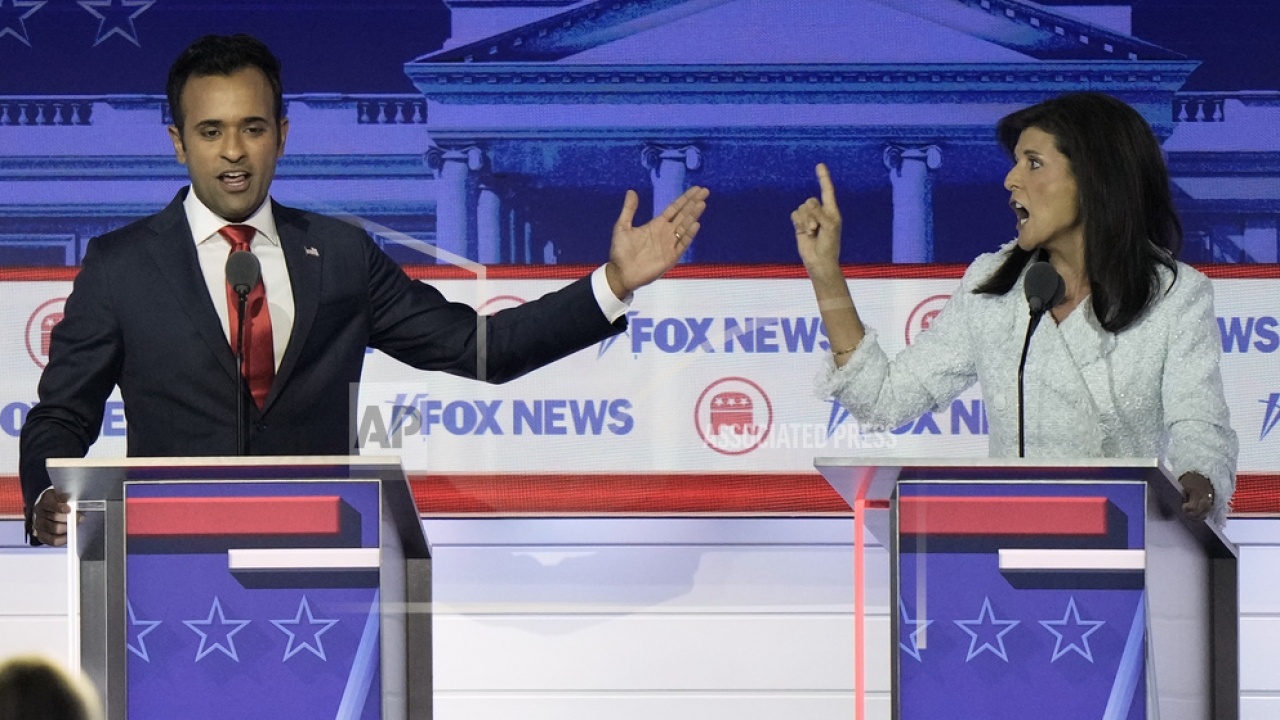History was made as eight Republican presidential candidates took the debate stage Wednesday night in Milwaukee.
For the first time, two Indian American candidates vying for the highest office in the land qualified for the grand debate stage.
Former South Carolina Gov. Nikki Haley went head-to-head against tech entrepreneur Vivek Ramaswamy. Haley lambasted Ramaswamy over his foreign policy regarding Ukraine and Israel.
Ramaswamy raised his hand on the debate stage when asked if he would support cutting aid to Ukraine. That’s when Haley jumped on his lack of experience.
“Ukraine is the first line of defense for us. And the problem that Vivek doesn’t understand is he wants to hand Ukraine to Russia,” Haley said. “He wants to let China eat Taiwan. He wants to go and stop funding Israel."
“Nikki, I wish you well on your future career on the boards of Lockheed and Raytheon,” Ramaswamy retorted before Haley hit back.
“I’m not on the board of Lockheed and Raytheon. You know you’ve put down everyone on this stage, but you want to go and defund Israel, you know, want to give Taiwan to China, you want to give Ukraine to Russia,” Haley said. “You have no foreign policy experience and it shows.”
As the two children of Indian immigrants debated, Indian Americans watched closely. According to Pew Research, 68% of Indian Americans identify with the Democratic Party. But there are nuances. Asian registered voters born in the U.S. are more likely than those who immigrated to the country to affiliate with the Democratic Party. Those born in the U.S. surveyed at 73% Democratic or leaning Democratic, compared with 56% of foreign-born Asian registered voters.
For Republican Dev Karlekar of New Jersey, seeing the two GOP Indian Americans on stage was a source of pride. For Democrat Navjot Kaur of New York City, watching the debate was an education to see why Indian Americans may turn conservative and an illustration of the vast differences between the two parties.
“As an Indian American watching this, it’s important to see how big the contrast is between the parties,” said Kaur, who works in Democratic politics.
Karlekar is a member of the GOP South Asian Caucus and has financially supported both Haley and Ramaswamy. Both are excellent candidates, he said, noting Haley’s three decades in public service and Ramaswamy's successful entrepreneurial background.
“As an Indian American, it’s a matter of pride to see these two candidates,” Karlekar said, noting that the general election is still a long way away as he plans to support the party’s candidate then.
In Democratic Indian American circles, there’s a condemnation of both Haley and Ramaswamy’s extreme positions, Kaur said, adding she is disappointed that as children of immigrants who benefited from the Immigration and Nationality Act of 1965 abolishing race as a basis for immigration, Ramaswamy and Haley would deny others the same opportunities.
On the Democratic side, Kamala Harris, who is a biracial Indian, was on the presidential debate stage in 2019 before becoming President Joe Biden's vice presidential pick.
Others on the debate stage Wednesday night were Florida Gov. Ron DeSantis, South Carolina Gov. Tim Scott, former New Jersey Gov. Chris Christie, former U.S. Vice President Mike Pence, former Arkansas Gov. Asa Hutchinson and North Dakota Gov. Doug Burgum.
Candidates must have at least 40,000 donors and hit 1% in a number of national and state polls to qualify for the debate stage.
Ramaswamy, 37, who is a Hindu from Ohio, has branded himself as pro-Trump. Haley, 51, converted from Sikh to Christianity and has flip-flopped on questions about Trump.
Haley was the 29th United States ambassador to the United Nations in the Trump administration.
Ramaswamy’s family hails from Kerala in southern India while Haley’s family is from Punjab in the north. Kaur describes it as a difference in regional cultures, much like New York is very different from Texas. Kerala is a progressive area where many women hold public offices, Kaur said.
Karlekar says there’s unity when it comes to Indians in America. India is incredibly diverse and different religions and cultures have worked together there for 10,000 years, he said.







